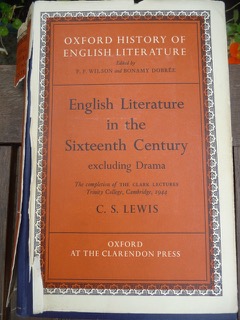More on ‘New Learning and New Ignorance’
C. S. Lewis is the great debunker of shallow modern
thinking. It’s amazing how much the myth of progress, which reigned in his
days, is still with us. So it’s refreshing to read what he writes (in English Literature in the Sixteenth Century) about
Renaissance thought.
Two things, he tells us, that were ‘reborn’ in the
Renaissance are things that modern thinking consigns to a ‘medieval’ dustbin:
astrology and magic. It might surprise some people to learn that these two
practices underwent a new and more ‘scientific’ development in the fifteenth
and sixteenth centuries. Even more surprising: these two systems, which you
might expect, as ‘superstitions’, to be arm-in-arm, were actually at daggers
drawn. How come? Lewis explains: the magician asserts human omnipotence; he
believes that, if he can find the key, he can control Nature. The astrologer
asserts human impotence; he is a determinist, believing that everything humans
do is controlled by natural powers far beyond their control.
Lewis says that, separate from witchcraft, there arose
another, quite respectable kind of magic in the Renaissance, sometimes called
‘high magic’. In medieval literature there is plenty of magic—such as is
practised by Merlin, King Arthur’s wizard, for example. But magic in medieval
stories is unmistakably fairy-tale magic. In fact ‘magic’ is the earliest
meaning of faerie in medieval
English—it’s ‘fay-ery’, what ‘fays’ do, rather than what real-world people do.
It ‘could rouse a practical or quasi-scientific interest in no reader’s mind’,
says Lewis. But when you come to the Renaissance, things are different. Magic
is portrayed as something that ‘might be going on in the next street’.
‘Shakespeare’s audience,’ (Lewis again) ‘believed that magicians not very
unlike Prospero’ (in The Tempest) ‘might exist.’
High magic can be studied in the works of European writers
from the mid fifteenth century onwards, even in Henry More’s Philosophical
Works (1662); the supposed ‘medieval
survival’ outlived all the other achievements of the Elizabethans. And actually
its exponents, in common with the other humanists of the period, had contempt
for the ‘middle ages’. They regarded themselves as reviving learning that had
been lost during that ignorant period. It had been forbidden and denounced by the
Church right from the start; unjustly, because it is a ‘high holy learning’.
Why is it ‘high’? Because it held that ‘there are many potent spirits besides
the angels and devils of Christianity’.
Lewis goes on to show (and I have no space to summarize it)
that this Renaissance magic was based on a very widespread and well-established
‘Platonic theology’. And, he says, the new magic is no anomaly but ‘falls into
its place among the other dreams
of power which then haunted the European mind’. Francis Bacon, the pioneer of
the new science, has much in common with the magicians. Both seek knowledge for
the sake of power and both dream of a time when Man will be able to perform
‘all things possible’. And indeed Bacon thought that the aim of the magicians
was ‘noble’. The major difference is that science succeeded and magic
failed—but at the time they didn’t know that this would happen.
What then did the astrologer and the magician have in
common? Lewis says: ‘both have abandoned an earlier doctrine of Man’. The
medieval doctrine guaranteed humans, in their place on the hierarchy of being,
their own limited freedom and efficacy. But now both became uncertain: ‘perhaps
Man can do everything, perhaps he can do nothing.’

Well I am still finding that fascinating. I loved the way Lewis cuts in between all the different ideas which flew around in the Renaissance intellectual culture, and demonstrates how each relates to the others. So interesting, especially in view of later developments too -
ReplyDeleteThis is so interesting. I'm teaching The Tempest at the moment and we've done some work on John Dee and magic. What you've written here would really help to clarify. Would I be able to use it? Would you mind?
ReplyDeletePlease help yourself! Every word of it is borrowed (well or badly) from C. S. Lewis. He mentions Dr Dee in this chapter of ELSC. Thank you for being interested.
Delete